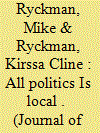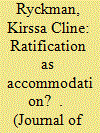|
|
|
Sort Order |
|
|
|
Items / Page
|
|
|
|
|
|
|
| Srl | Item |
| 1 |
ID:
152711


|
|
|
|
|
| Summary/Abstract |
Transnational terrorism is a complex, multinational phenomenon, and the transnational terrorism literature has increasingly turned to a dyadic research design in order to better capture these complexities. However, existing dyadic data tend to be proprietary or limited in scope, resulting in barriers for replication and generating new research. Toward that end, we develop a method to generate a dyadic transnational dataset using the publicly available Global Terrorism Database (GTD). The method is based on the premise that terror groups have a domestic agenda that is tied to a “home” state, which can be discerned based on the group’s patterns of attack. Dyads can then be constructed, where one side is the terror group’s home state and the other side is the target state, defined both by location of attack and the nationality of victims. To illustrate the utility of the data, the “logic of home” is applied to the question of transnational target selection. We replicate existing findings that examine the effect of troop deployments on the likelihood of transnational terrorist attacks, finding that troop deployments increase the likelihood of attacks against nationals of the deploying country. We further explore the effect of third-party support to the government side of a civil war, and find that intervention increases both the likelihood of attacks against nationals of the third-party intervener as well as attacks on the home soil of the intervening state.
|
|
|
|
|
|
|
|
|
|
|
|
|
|
|
|
| 2 |
ID:
146928


|
|
|
|
|
| Summary/Abstract |
Repression is the expected response to anti-government protest; however, leaders can also accommodate demonstrators. Committing to human rights treaties is considered in this environment, where treaty commitments are conceptualized as a policy concession that leaders can grant dissenters. Past research has shown that top-down domestic pressures, such as new democratic regimes, can influence treaty commitments. This article extends this line of research by considering the influence of bottom-up domestic pressure, arguing that nonviolent, pro-democracy movements can pressure leaders into concessions, as these movements are risky to repress but threatening to ignore. Leaders are expected to seek ‘cheap’ accommodations, and commitments to human rights treaties provide a relatively low-cost concession that also addresses demonstrators’ pro-democracy demands. Using commitments to the nine core UN human rights treaties, results are generally supportive. Governments experiencing a nonviolent, pro-democracy movement are consistently likely to sign human rights treaties. Ratification is also likely but in more limited contexts, and is more closely related to movement success. This suggests that bottom-up pressures can influence commitment to human rights treaties, but there may be little substance behind those concessions. The status quo and cost-averse preferences of leaders lead them to grant accommodations that result in minimal change and cost.
|
|
|
|
|
|
|
|
|
|
|
|
|
|
|
|
| 3 |
ID:
173773


|
|
|
|
|
| Summary/Abstract |
Nonviolent resistance can be a powerful tool for ordinary civilians to transform their governments; however, not all nonviolent movements end in success and many ultimately escalate into violent conflicts. To understand this escalatory process, I begin with the premise that social movements are not unitary actors but a collection of groups with varied preferences on goals and tactics. I argue that escalation is likely when movements have violence-wielding groups among their varied factions, as these groups deal in violence, believe in its utility, and can make the strategic decision to engage in violence as needed. I argue this is particularly likely when the campaign fails to make progress using nonviolent channels, suggesting that nonviolent tactics will not be successful to achieve the group’s goals. Expectations are tested using the Nonviolent and Violent Campaigns and Outcomes data and the case of Algeria’s escalation from a nonviolent movement to brutal civil war, and results are generally supportive.
|
|
|
|
|
|
|
|
|
|
|
|
|
|
|
|
|
|
|
|
|